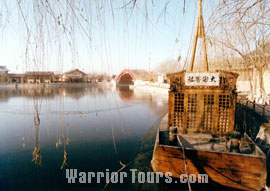Three Kingdoms Period (220 - 280)

In the later years of the Eastern Han Dynasty (25 - 220), regional independent forces gradually broke away from the central government, each dominating part of the country and exercising de facto authority. This resulted in the formation of the Three Kingdoms – Wei, Shu and Wu, among which the Wei State under Cao Cao was the strongest, while the Shu State under Liu Bei and the Wu State under Sun Quan were initially comparatively weaker.
Through the Yellow Turbans peasant uprising at the end of later Han, the eunuchs grasped state power. In order to recapture the Han royal family's power, He Jin, brother of Empress He, planned to appeal to Dong Zhuo and Ding Yuan. However, he was killed before the local forces came. General Yuan Shao took the opportunity to lead his followers to enter the palace, and killed over 2,000 eunuchs, but Emperor Liu Bian and his brother Liu Xie were kidnapped from the palace and controlled by Dong Zhuo. Dong Zhuo then dethroned Liu Bian, and made Liu Xie emperor. To strengthen his force, Dong Zhuo killed Ding Yuan and used stratagems to expel Yuan Shao. However, Yuan Shao was recalcitrant, building his own army consisting of 11 local armies around the Bohai Sea, known historically as The Guandong Coalition. Thereafter, the regional forces began to develop their own powers in turn, of which Yuan Shao and Cao Cao were the most dominant.
In 200, Cao Cao and Yuan Shao fought each other in Guandu (northeast of ZhongMou County, Henan Province Today). Cao Cao defeated Yuan Shao with his weaker army, and captured Yuan's base – Yecheng (Linzhang County, Hebei Province today) by exploiting the differences between Yuan Shao's two sons. Later, Cao Cao occupied Qin, Ji, You and Bing States successively and unified central China. In 207, Cao Cao went on a punitive expedition against the Wugeng people who had invaded northern China over a long period. In 209, Cao Cao led his army south to occupy Jinzhou. Liu Bei, who was based in Jingzhou, escaped to the south to ally with Sun Quan. Then, the allied forces of Sun and Liu heavily defeated Cao Cao's army with a numerically inferior force in Chibi (Puqi County, Hubei Provinces). Cao Cao was driven back to central China. After retreating to the north, Cao Cao enlarged his sphere of influence to the entire north.
In 220, Cao Cao, who had obtained the title of prime minister and King Wei, died of illness, and his son Cao Pi inherited his position. Soon, Cao Pi overthrew the regime of the Eastern Han and established the Wei State. After the Battle of Chibi, Liu Bei accepted Zhuge Liang's advice and entered Yizhou (Sichuan Province today) in 212. In 220, Liu Bei captured Hanzhong from Cao Cao, and made himself emperor the following year, with 'Han' (also named Shuhan historically) as the state title. In the same year, Sun Quan who seized Yangzhou, Jingzhou and Jiaozhou (the middle and lower reaches of the Yangtze River and parts of the Pearl River) accepted the investiture of the Wei State, and named himself King Wu. In 229, Sun Quan renamed himself emperor and established Wu State. From that point the tripartite conflict of the three kingdoms began, and China fell into a maelstrom of wars and chaos.
The three kingdoms' territories were distinct: the Wei State ruled north China, the Shu State possessed southwest China, and the Wu State seized southeast China.
In 263, the Sima family who had controlled the power of the Wei State annexed the Shuhan regime. In 265, Sima Yan dethroned Emperor Yuandi of the Wei State, and then established Western Jin Dynasty (265 - 316). In 280, Western Jin captured the Wu State to the south of the Yangtze River, and unified China again. The Three Kingdoms periods ended.

